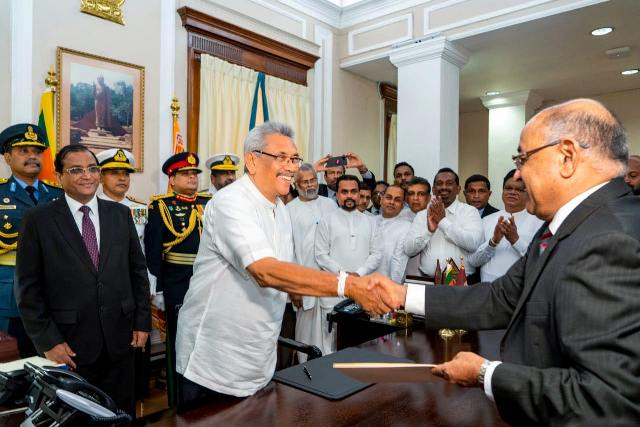 A Rajapaksa will once again be in President’s House in Colombo after an emphatic win for Gotabaya Rajapaksa in the 16 November election.
A Rajapaksa will once again be in President’s House in Colombo after an emphatic win for Gotabaya Rajapaksa in the 16 November election.
A Rajapaksa will once again be in President’s House in Colombo after an emphatic win for Gotabaya Rajapaksa in the 16 November election. He avoided the need for a run-off vote after winning 52% in the first round, helped by the opposition vote being split between a record 34 other candidates.
An army officer for 20 years and defence minister from 2005-15, he helped oversee the brutal defeat of the Tamil Tiger rebels with his older brother, the former president and prime minister Mahinda Rajapaksa (see Commonwealth Update, November 2013). He won much acclaim from the Sinhalese majority, earning the nickname ‘the Terminator’, but was accused of complicity in war crimes. A police report read in court identified him as directing a secret death squad that targeted critics, such as the newspaper editor Lasantha Wickrematunge. Rajapaksa has denied the allegations.
His main rival was Sajith Premadasa, of the newly formed New Democratic Front, led by the United National Party, which controls parliament. He is also the scion of a leading political family (his father, Ranasinghe Premadasa, was assassinated while president in 1993 by a Tamil Tiger suicide bomber) and a UNP cabinet minister, despite major differences with the pre-election prime minister, Ranil Wickremesinghe.
For the Colombo analyst Prof Jayadeva Uyangoda, Rajapaksa promised an ‘oligarchic regime’ with an emphasis on national security, while Premadasa appealed to the urban and rural poor, offering state-led redistribution for those left behind by neo-liberalism with policies such as free sanitary pads for poor women. Predicting that the next two biggest candidates – Anura Kumara Dissanayake and Mahesh Senanayake – might take 8-10% of the vote, Uyangoda rightly predicted that: ‘Rajapaksa stands to gain from the disunity of his rivals.’
The election commission said the campaign had been relatively peaceful but broadcasts of both private and state-controlled television networks had been highly biased. An International Crisis Group report in September said that since the Easter Sunday bombings Sri Lanka’s Muslims had faced ‘a significant backlash’ with at least 1,800 arrested and hundreds left in custody. It said: ‘Sinhalese Buddhist nationalists have waged a campaign of violence and hate while a weak and divided political leadership has either stood idly by or, worse, egged on the abuse,’ the iCG said. Rajapaksa’s reputation as a hardline Sinhalese Buddhist nationalist meant that Muslims and Tamils voted overwhelmingly for Premadasa. Accordingly, a gun attack on buses of Muslim voters near Puttalam on election day was not unexpected. Unofficial roadblocks and a heavy military presence were reported in Tamil areas.
The new president swiftly consolidated power in the hands of the Rajapaksas: his brother Mahinda was sworn in as prime minister and finance minister, along with two other portfolios; another brother, Chamal, took four ministerial posts; and a third brother, Basil, was named chief strategist. Rajapaksa tried to be reassuring, however, tweeting that ‘irrespective of which race or religion they belong, I am deeply committed to serve all the people of Sri Lanka.’ The country’s ethnic and religious minorities will be hoping that proves to be the case.



